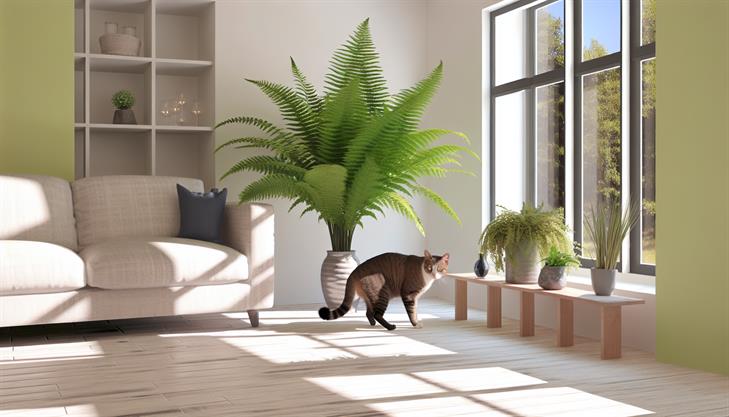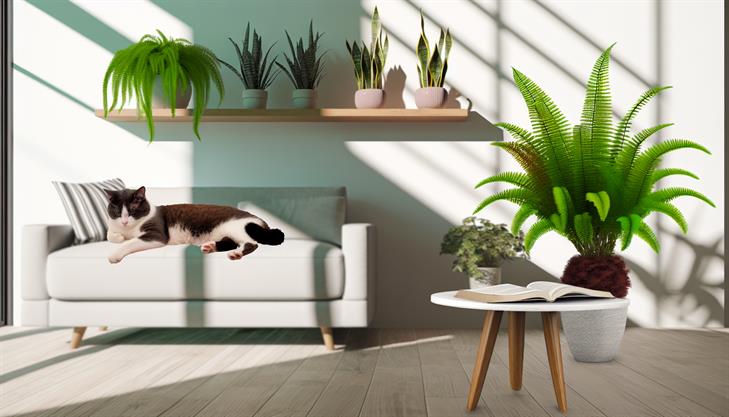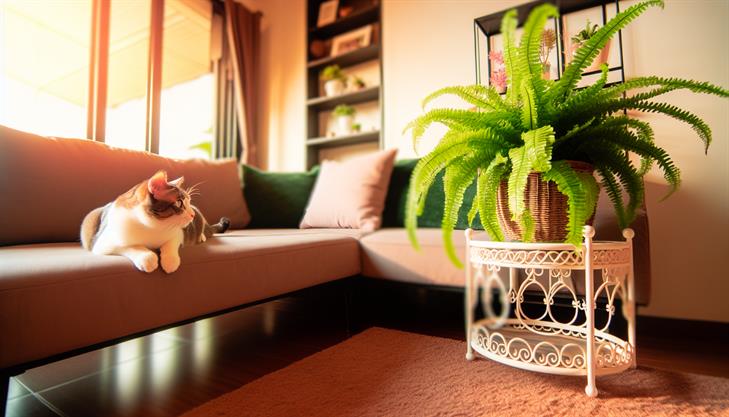Anyone with a green thumb and a furry friend knows the delicate balance of keeping both plants and pets happy indoors. Among the lush greenery that graces many homes, Boston ferns stand out for their delicate, feathery fronds that lend a touch of elegance to any living space. However, if you’re a cat owner, you might find yourself pausing before bringing this vibrant plant into your home. The question looms: are Boston ferns toxic to cats? Understanding the safety of your houseplants is critical, as curious cats often see green leaves not just as decoration but as an intriguing snack. In this guide, we delve into the nature of Boston ferns, unraveling myths and truths to ensure both your home remains verdant and your feline companions stay healthy. By the end of this post, you’ll have the insights you need to make informed decisions for a harmonious home where plants and pets coexist peacefully.
Understanding Boston Ferns and Their Safety for Cats
Boston ferns (Nephrolepis exaltata), known for their lush and arching fronds, are popular houseplants due to their elegant appearance and air-purifying benefits. If you’re a cat owner considering adding a Boston fern to your home, you’re likely concerned about the plant’s safety regarding your feline friends. Fortunately, Boston ferns are non-toxic to cats, making them a safe choice for households with curious pets.
Understanding the Non-Toxic Nature of Boston Ferns
Boston ferns are non-toxic to cats and dogs, according to the American Society for the Prevention of Cruelty to Animals (ASPCA). This classification means that if your cat happens to nibble on a frond or two, it should generally not experience any adverse reactions or health issues. However, as with any non-toxic plant, excessive ingestion could potentially lead to mild digestive upset, such as vomiting or diarrhea. Therefore, it’s still advisable to monitor your pet’s interaction with the plant.
Tips for Incorporating Boston Ferns into Your Home
While Boston ferns are safe, it’s crucial to create an environment where both the plant and your pet can coexist harmoniously:
-
Placement: Position your fern in a spot that maximizes light and moisture conditions ideal for the plant while minimizing risk for your cat. Hanging baskets or elevated plant stands can keep the fern out of easy reach, reducing the temptation to chew.
-
Discourage Chewing: If your cat shows interest in nibbling on the fronds, consider using pet-safe deterrents like a citrus spray, which cats typically dislike, or pit safe toys that are more attractive to your cat.
-
Environmental Enrichment: Providing your cats with alternatives for play, such as cat grass or interactive toys, can divert their attention from the fern.
-
Regular Monitoring: Keep an eye on both your plant’s health and your pet’s behavior. A sudden change, like yellowing leaves due to overwatering or increased interest from your cat, may require adjustments in care or positioning.
Other Safe Indoor Plant Options
If Boston ferns aren’t your preferred choice, consider other non-toxic plants like spider plants, areca palms, and certain varieties of orchids, all of which are also safe for cats.
Dealing with Common Plant Issues
Boston ferns thrive with a specific care routine, which includes:
-
Humidity Requirements: Boston ferns prefer humid environments, so mist them regularly or place them near a humidifier, especially during dry seasons, to prevent leaf browning.
-
Lighting: These ferns flourish in indirect sunlight. Direct sunlight can scorch their leaves, so it’s best to find a bright but indirectly lit spot.
-
Watering: Keep the soil consistently moist but not soggy. Over-watering might lead to root rot, while under-watering can cause leaf crisping.
By following these care guidelines and taking simple preventive measures, you can enjoy the beauty of Boston ferns without compromising your cat’s safety. Remember, when introducing any new plant into a home with pets, it’s always a good idea to monitor interactions closely and make adjustments as needed.
Tips for Choosing Pet-Friendly Plants
When introducing new plants into your home, especially if you’re a pet owner, it’s crucial to ensure that these plants won’t harm your beloved animals. One common question many cat owners have is: Are Boston ferns toxic to cats?
The good news is that Boston ferns (Nephrolepis exaltata) are not toxic to cats. According to the American Society for the Prevention of Cruelty to Animals (ASPCA), Boston ferns are safe for both cats and dogs. Despite their non-toxic nature, there are still some important considerations to keep in mind when incorporating these plants into your home.
Understanding Plant Safety for Pets
-
Non-Toxic Doesn’t Mean Ideal for Chewing: While Boston ferns are safe in terms of toxicity, excessive consumption of plant material can still cause digestive upset in cats. If your cat has a tendency to nibble on plants, it’s wise to monitor its interaction with your fern.
-
Monitor Plant Damage: Cats might be drawn to the delicate fronds for play or chewing. This could lead to a battered-looking plant and potential digestive disturbances in your pet. Consider placing the plant in a hanging basket or elevated area to deter playful swats.
Tips for Integrating Boston Ferns into a Pet-Friendly Home
-
Choose the Right Location: Place your Boston fern in a spot that receives indirect sunlight. While the plant thrives in bright, filtered light, too much direct sun can scorch the leaves, diminishing its lush appearance and making it less attractive to cats.
-
Maintain Proper Humidity: Boston ferns prefer a humid environment, which mimics their natural habitat. To enhance humidity, mist the plant regularly or place it on a tray filled with water and pebbles. This setup not only benefits the plant but also reduces the frequency of falling leaves – a common cat temptation.
-
Establish a Feeding Routine: Use a balanced, water-soluble fertilizer monthly during the growing season (spring and summer) to keep your fern vibrant. A healthy plant is less likely to shed fronds, reducing the cat’s temptation to play with or chew fallen leaves.
-
Monitor Cat Behavior: Even though Boston ferns are safe, logically observe your cat’s interaction with the plant. If they seem uninterested, you might not need further deterrents. Conversely, a cat obsessed with the plant may need additional distractions.
-
Provide Alternative Chewing Options: If your cat enjoys greenery, consider providing cat grass (wheatgrass) as a safe and preferable alternative. This can redirect their attention from the fern and satisfy their need to chew on plants.
Common Issues and Solutions
-
Leaf Browning: This may indicate under-watering or insufficient humidity. Ensure the soil stays moist but not soggy, and boost humidity levels.
-
Wilting: Over-watering or a lack of light can cause wilting. Ensure proper drainage and evaluate light exposure to correct the issue.
By following these tips, you can enjoy a lush, healthy Boston fern in your home without compromising your cat’s safety or health. Always keep an eye on your pet and adjust your approach as needed to foster a harmonious environment for both plants and animals.
How to Identify Toxic Signs in Cats
Boston ferns, known scientifically as Nephrolepis exaltata, are a popular choice for houseplant enthusiasts due to their lush, cascading fronds and their ability to improve indoor air quality. If you’re a cat owner, understanding the relationship between your feline companions and your plant collection is crucial to ensuring a safe environment. A common query among pet owners is whether Boston ferns are toxic to cats.
Non-Toxic Nature of Boston Ferns
The good news for cat owners is that Boston ferns are non-toxic to cats. They are listed by the American Society for the Prevention of Cruelty to Animals (ASPCA) as safe and non-toxic to both cats and dogs. This makes them an excellent addition to pet-friendly households. However, it’s essential to recognize that even non-toxic plants can cause minor digestive upset if ingested in large quantities.
Preventive Measures and Care Tips
-
Placement Considerations: Although Boston ferns are safe, it’s wise to place them out of reach if your cat tends to chew on houseplants. Cats are naturally curious, and many enjoy nibbling on plants. By positioning your Boston fern on a high shelf or in a hanging pot, you can minimize your cat’s access while keeping your plants thriving.
-
Understanding Cat Behavior: Cats may be drawn to plants due to their movement, texture, or simply boredom. Providing a variety of cat-safe plants, like catnip or wheatgrass, can satiate your cat’s need to chew and help keep them away from decorative plants.
-
Monitoring and Supervision: Keep an eye on your cat’s interaction with houseplants. While the Boston fern won’t harm your cat, ingesting any plant material can cause mild symptoms like vomiting or diarrhea. If you notice your cat frequently chewing on your Boston fern, consider consulting with your veterinarian to rule out any underlying health issues.
-
Creating a Stimulating Environment: Enrich your home with cat-friendly alternatives that can distract your pet from non-edible plants. Interactive toys, scratching posts, and puzzle feeders can provide mental and physical stimulation, reducing the likelihood of your cat targeting your houseplants.
-
Educate Other Household Members: Ensure that everyone in the household, including young children, understands the importance of keeping curiosity-driven interactions between cats and plants to a minimal. This not only protects your greenery but ensures your cat’s well-being.
Potential Health Indicators
While Boston ferns are not toxic, it’s essential to be aware of general signs that might suggest plant toxicity in cats, either from other flora or substances. Symptoms to watch for include excessive drooling, changes in appetite, lethargy, and persistent vomiting. If you observe any of these signs, recall any potential plant exposure and contact a veterinarian for advice.
In summary, Boston ferns are a safe choice for households with cats, allowing you to enjoy the beauty of greenery without compromising your pet’s safety. By taking simple preventive measures, you can maintain a harmonious environment where both plants and pets can thrive.
Caring for Boston Ferns in Cat-Friendly Homes
Boston ferns, known for their lush, feathery fronds, are a popular choice among houseplant enthusiasts. A common concern for pet owners is whether boston ferns are toxic to cats. Fortunately, boston ferns (Nephrolepis exaltata) are non-toxic to cats, making them an excellent choice for cat-friendly homes. Let’s explore how to care for these beautiful plants while ensuring the safety and happiness of your feline friends.
Plant Placement and Setup Tips
When introducing a boston fern into your home, consider placing it in an area where it can receive indirect sunlight. Bright, indirect light helps maintain the fern’s vibrant green color and encourages healthy growth. Avoid direct sunlight, as it can scorch the delicate fronds.
To make the environment even more welcoming for both your boston fern and your cat, choose a spot that is also slightly out of reach from playful paws. Hanging baskets or tall plant stands work well, minimizing the risk of your pet accidentally toppling the plant.
Humidity and Watering Needs
Boston ferns thrive in high humidity, which can be challenging to replicate indoors, especially during the winter. To increase humidity, you can mist the ferns regularly or place a humidity tray beneath the plant. A humidifier nearby is also a great option.
Watering is crucial for maintaining a healthy boston fern. Aim to keep the soil consistently moist, but not waterlogged. Check the top inch of soil regularly; if it feels dry, it’s time to water. Ensure your pot has good drainage to prevent root rot—a common issue that can arise from overly wet soil.
Soil and Fertilization
Use a well-draining potting mix, ideally one formulated for houseplants. This ensures proper aeration and moisture retention, crucial for the health of your boston fern.
Fertilize your fern once a month during the growing season (spring and summer) with a balanced, water-soluble fertilizer. Be cautious not to over-fertilize, as this can harm your plant.
Dealing with Cat Interactions
While boston ferns are safe for cats, curious pets may experience the temptation to chew on the fronds. To discourage this behavior, consider providing your cat with its own plant, like cat grass, which is safe and appealing for them to nibble on.
If your cat still shows interest in your fern, you might want to apply a pet-safe deterrent spray or use a bitter spray designed specifically to keep cats away from plants.
Common Issues and Solutions
Boston ferns are relatively easy to care for, but they can still face some common issues:
- Browning of Fronds: This often indicates low humidity or inconsistent watering. Increasing the humidity and ensuring regular watering can help.
- Pest Infestation: Occasionally, pests like spider mites and aphids might infest your fern. Treat them by washing the foliage with insecticidal soap or using a neem oil solution.
By following these tips and being mindful of your cat’s behavior, you can enjoy the beauty of boston ferns in your home without worry. Remember, a harmonious environment for both pet and plant will bring peace and joy to your living space.
Troubleshooting: What to Do if Your Cat Shows Symptoms
Boston ferns are popular houseplants known for their lush, feathery fronds and ability to purify indoor air. As a cat owner, you may be concerned about whether Boston ferns pose any risk to your feline friends. The good news is that Boston ferns (Nephrolepis exaltata) are non-toxic to cats, according to the American Society for the Prevention of Cruelty to Animals (ASPCA). However, it’s important to consider a few factors to ensure the safety and well-being of your cat.
Potential Issues:
-
Chewing and Nibbling: While Boston ferns are not poisonous to cats, some cats might be tempted to chew on them. This behavior can lead to the destruction of your plant and might cause mild digestive upset in your cat, such as vomiting or diarrhea, due to the ingestion of plant material.
-
Soil and Fertilizer Contact: Sometimes, it’s not the plant itself but the soil or fertilizers used that could pose risks. Fertilizers and pesticides present in the potting soil can be harmful if ingested. Always use pet-safe products and avoid harsh chemicals.
Setup and Tips:
-
Monitor Plant Interaction: Observe how your cat interacts with plants. If your cat tends to chew on your ferns, try relocating them to out-of-reach places like high shelves or use hanging baskets.
-
Provide Alternatives: If your cat is a natural plant chewer, offer alternative plants that are safe for them to nibble. Cat grass or catnip can be excellent choices to divert their interest away from your other houseplants.
-
Ensure Safe Environment: Regularly check your plants for signs of chewing or damage. This practice helps identify potential interest early on and allows you to take action before your cat develops a habit.
-
Educate and Prevent: Use deterrents such as citrus peels around the base of the plant, as cats are typically averse to citrus scents. You can also place double-sided tape on surfaces near the plant to prevent your cat from accessing it.
Additional Advice:
- Research Plant Varieties: If you have other houseplants, research their safety as well. Many common houseplants, unlike Boston ferns, can be toxic to cats.
- Veterinary Consultation: If your cat ingests a significant amount of any plant and shows symptoms like persistent vomiting, diarrhea, or lethargy, it is always best to consult your veterinarian for professional advice.
In summary, while Boston ferns are non-toxic and generally safe for cats, it’s crucial to implement preventive measures to discourage your pet from nibbling on them and ensure that any associated materials like soil additives are pet-safe. By being proactive, you can maintain a harmonious living environment that is enjoyable for both you and your feline companion.
In conclusion, Boston ferns are not toxic to cats, making them a safe and attractive option for pet owners who wish to enhance their living spaces with a touch of greenery. We explored the distinct characteristics of Boston ferns, which not only add aesthetic beauty to your home but also offer air-purifying benefits. It’s important to differentiate Boston ferns from other types of ferns that may be harmful to pets, and to always monitor your pets’ interactions with any household plants to prevent any potential issues.
By choosing non-toxic plants like the Boston fern, you can create a harmonious environment that caters to both your botanical interests and your furry companions’ safety. As a final tip, consider placing Boston ferns in areas where cats frequently play or relax, such as windowsills or shelves, to enrich their environment while enhancing your home’s natural decor.


